One of the most frightening scenarios that one may face in life is the loss of the ability to eat or eat enough. As it is, the horrific happening of Covid-19 may compromise oral and other routes of gastrointestinal nutrient repletion. Since Covid-19 infection carries with it a crushing immunocompromise, it is important to recognize that the most common global reason of immunodeficiency is malnutrition and that the leading causation of world morbidity/mortality is chronic malnutrition. Fortunately, clinicians have a variety of nutrition tools to feed patients (Figure 1). Of cause, if there is adequate gut absorptive, distributive, metabolic, and excretory processes, the preferred route of feeding is through the gastrointestinal (GI) tract.
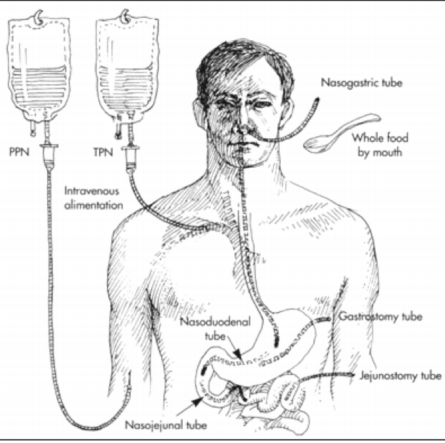
Covid-19 has the most criticality (particularly the aged) on the lungs but evidence is mounting that speaks to significant brain (stroke, confusion, headache, loss of smell) and gut (diarrhea, nausea, vomiting, abdominal pain) attack. If the GI tract cannot manage any or sufficient nutrition, the nutrition regimen can then be delivered directly into the vein or intravenously (also called parenteral). Most times, this includes the macronutrients (protein, carbohydrate and fat) and micronutrients (electrolytes, trace elements and vitamins). Total parenteral nutrition (TPN) is a term coined to indicate that both macronutrients and micronutrients are being administered in a peripheral or central vein. Most parenteral regimens are delivered around the clock. However, home intravenous feeding typically occurs during nighttime (usually a 12-hour hang time). Since the 70’s, more than 40,000 patients have received home TPN and many more, institutionally. This so-called home cyclical feeding of ‘hooking-up’ at bedtime and ‘unhooking’ in the morning may vary from once daily to, for example, only five days per week. A backpack pump is also available for feeding mobility.
These intravenous solutions are legend (prescription) products that are aseptically compounded (as many as two dozen sterile ingredients) by a pharmacist and respects the patient’s medical condition, age, weight, height, allergies, interactions and associated clinical assessment. Most solutions are terminally filtered through an on-line 0.2-0.45 micron filters to preserve the sterility of compounding and subsequent administration. Although the size of a Covid-19 particle is approximately 0.1 micron, the droplet is large enough to get caught by these filters, some of which are even capable of trapping fever-inducing lipopolysaccharide endotoxin. Endotoxin is a toxin or pyrogen released from within and through gram-negative bacterial cell walls.
Macronutrients
In general, solutions contain protein (amino acids), sugar (glucose that is also called dextrose) or glycerol (glycerin) for energy. It is imperative that patient nutrition screening and assessment are done without delay since body protein can be catabolized at a rate of 75 to 150 grams per day that is equivalent to 300 to 600 grams of lean body mass (primarily muscle). The brain will also require a minimum concentration of dextrose (150 grams per day) or ketones from fat (lipid). Intravenous fats (soybean, olive oil, fish oil and medium chain triglycerides) are generally included for more calories and to prevent essential fatty acid deficiencies that may occur as early as five days without fat.
Micronutrients
In addition, a typical nutrition solution may contain electrolytes (minerals) such as sodium, potassium, magnesium, calcium, phosphate and salts such as acetate, chloride and sulfate. Trace elements, such as chromium, copper, iron, manganese, molybdenum, selenium and zinc are usually included alone or in combination. The solution will contain multivitamins and may include increased doses of individual vitamins. Vitamins or vitamers are coenzymes that are required to adequately ensure that biochemical deficiencies are addressed. Most vitamins are water soluble and will be renally excreted if supplied in excess. Vitamins A,D,E and K are fat soluble and will require enteral fat to be adequately absorbed. Vitamins assist with bone metabolism, heal wounds, promote the immune system, convert food into energy, and repair cellular damage. Further, vitamins cannot be synthesized in totality or in sufficient concentrations endogenously without adequate intake and can only find their way into the body through enteral or parenteral nutrition. The daily oral micronutrient amounts required for health can be found in the RDA (Recommended Dietary Allowance) and the AI (Adequate Intake) requirements. However, one must remember that in addition to diet, sun exposure, skin color, body mass index and gastrointestinal transit will have an impact on micronutrient status.\
Additives
There are no drugs or other therapeutics approved by the US Food and Drug Administration to prevent or treat COVID-19. None of the antivirals, antimalarials, antilupus or immunotherapeutic agents are compatible in TPN solutions. Pharmacists should always be consulted for chemical and physical stability of any medication that may be added to the TPN or any agent that may be y-typed with TPN.
Monitoring
Initially, then weekly to monthly testing after stabilization, successful TPN requires meticulous monitoring of the individual's vitals, weight, blood monitoring (i.e., protein, glucose, lipid, electrolytes, complete red/white/ platelet counts, gases etc) fluid balance, urine output, waste products in the blood (i.e., urea) and, as needed, trace element and vitamin status. The contents of the nutrition solution are then individualized based on the results of these tests and organ function. Parenteral nutrition therapy can be intense and requires a cohesive team of professionals (physician, nurse, clinical pharmacist, clinical dietitian and others) to minimize complications.
Finally, if the gut decides it will not function normally because of the ravages of Covid-19 or for other reasons (i.e., aging or other diseases) - rest easy knowing that there is a modality with the expertise of a nutrition team that will provide life-saving intravenous feeding.
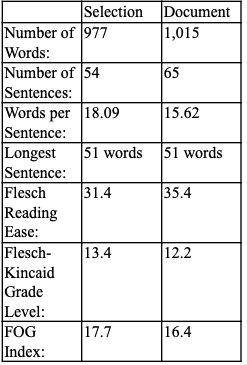
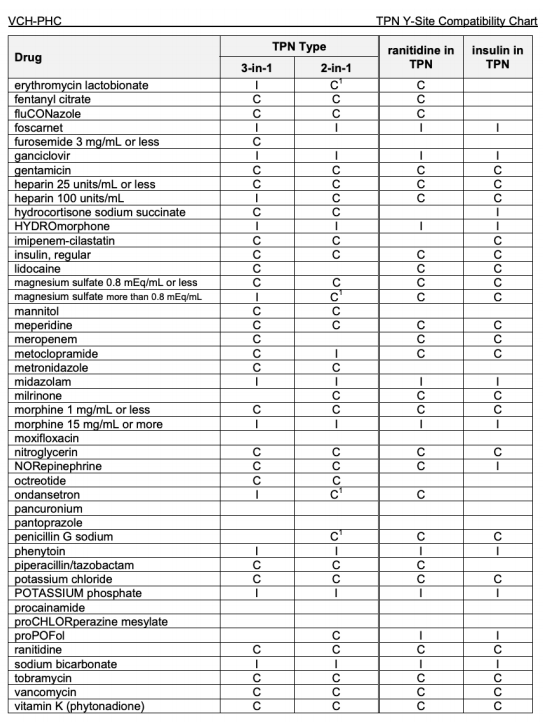

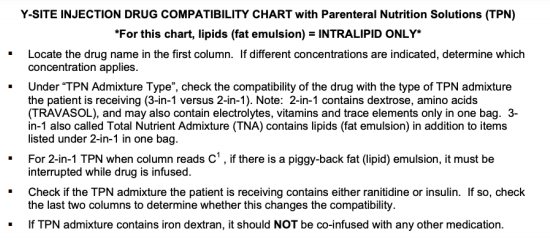
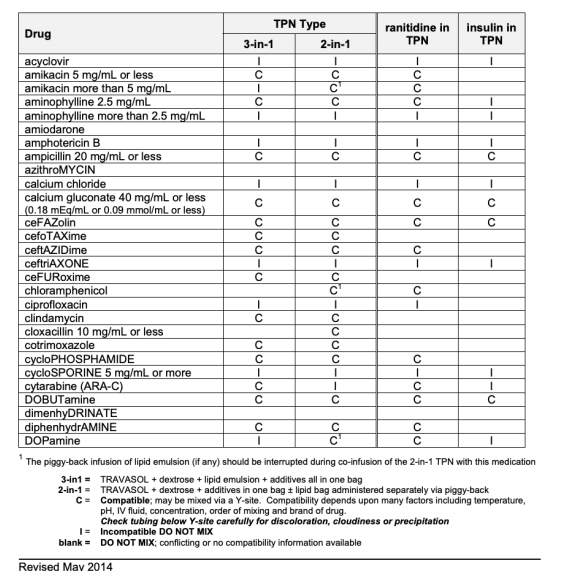
Author: Thomas G. Baumgartner, Pharm.D., M.Ed., FASHP is President/CEO Consultant Pharmacists of America, Inc


